
Geoffrey Charles Ryman is a Canadian writer of science fiction, fantasy, slipstream and historical fiction. Ryman has written and published seven novels, including an early example of a hypertext novel, 253. He has won multiple awards, including the World Fantasy Award.
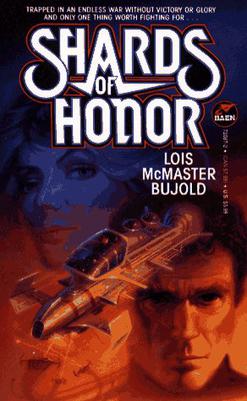
The Vorkosigan Saga is a series of science fiction novels and short stories set in a common fictional universe by American author Lois McMaster Bujold. The first of these was published in 1986 and the most recent in May 2018. Works in the series have received numerous awards and nominations, including five Hugo award wins including one for Best Series.

Friday is a 1982 science fiction novel by American writer Robert A. Heinlein. It is the story of a female "artificial person", the eponymous Friday, genetically engineered to be stronger, faster, smarter, and generally better than normal humans. Artificial humans are widely resented, and much of the story deals with Friday's struggle both against prejudice and to conceal her enhanced attributes from other humans. The story is set in a Balkanized 21st century, in which the nations of the North American continent have been split up into a number of smaller states.

Joe William Haldeman is an American science fiction author.
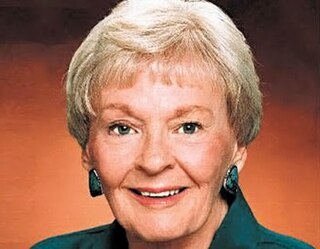
Sheri Stewart Tepper was an American writer of science fiction, horror and mystery novels. She is primarily known for her feminist science fiction, which explored themes of sociology, gender and equality, as well as theology and ecology. Often referred to as an eco-feminist of science fiction literature, Tepper personally preferred the label eco-humanist. Though the majority of her works operate in a world of fantastical imagery and metaphor, at the heart of her writing is real-world injustice and pain. She employed several pen names during her lifetime, including A. J. Orde, E. E. Horlak, and B. J. Oliphant.
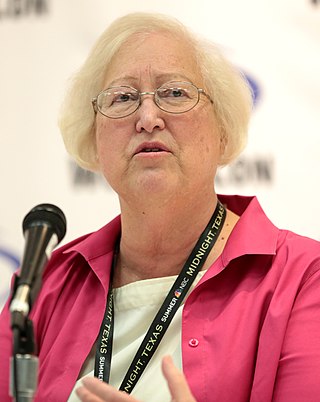
Constance Elaine Trimmer Willis, commonly known as Connie Willis, is an American science fiction and fantasy writer. She has won eleven Hugo Awards and seven Nebula Awards for particular works—more major SF awards than any other writer—most recently the "Best Novel" Hugo and Nebula Awards for Blackout/All Clear (2010). She was inducted by the Science Fiction Hall of Fame in 2009 and the Science Fiction Writers of America named her its 28th SFWA Grand Master in 2011.
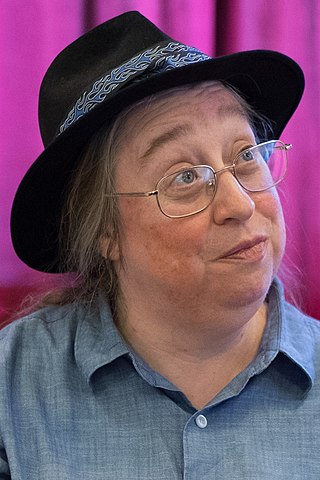
Jo Walton is a Welsh-Canadian fantasy and science fiction writer and poet. She is best known for the fantasy novel Among Others, which won the Hugo and Nebula Awards in 2012, and Tooth and Claw, a Victorian-era novel with dragons which won the World Fantasy Award in 2004. Other works by Walton include the Small Change series, in which she blends alternate history with the cozy mystery genre, comprising Farthing, Ha'penny and Half a Crown. Her fantasy novel Lifelode won the 2010 Mythopoeic Award, and her alternate history My Real Children received the 2015 Tiptree Award.
Robert David Reed is a Hugo Award-winning American science fiction author. He has a Bachelor of Science in Biology from the Nebraska Wesleyan University. Reed is an "extraordinarily prolific" genre short-fiction writer with "Alone" being his 200th professional sale. His work regularly appears in Asimov's, Fantasy & Science Fiction, and Sci Fiction. He has also published eleven novels. As of 2010, Reed lived in Lincoln, Nebraska with his wife and daughter.
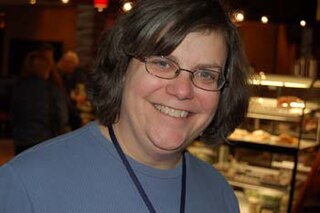
Maureen F. McHugh is an American science fiction and fantasy writer.
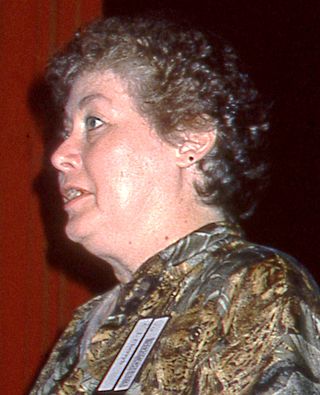
American writer C. J. Cherryh's career began with publication of her first books in 1976, Gate of Ivrel and Brothers of Earth. She has been a prolific science fiction and fantasy author since then, publishing over 80 novels, short-story compilations, with continuing production as her blog attests. Cherryh has received the Hugo and Locus Awards for some of her novels.
Geoff Ryman is a writer of science fiction, fantasy and slipstream fiction. Ryman has written and published seven novels, including an early example of a hypertext novel, 253. He has won multiple awards, including the World Fantasy Award.

The Hugo Award is an annual literary award for the best science fiction or fantasy works and achievements of the previous year, given at the World Science Fiction Convention (Worldcon) and chosen by its members. The award is administered by the World Science Fiction Society. The Hugo is widely considered the premier award in the science fiction genre. It is named after Hugo Gernsback, the founder of the pioneering science fiction magazine Amazing Stories. Hugos were first given in 1953, at the 11th World Science Fiction Convention, and have been awarded every year since 1955.

Cetaganda is a science fiction novel by Lois McMaster Bujold, first published in four parts from October to December 1995 in Analog Science Fiction and Fact, and published in book form by Baen Books in January 1996. It is a part of the Vorkosigan Saga, and was included in the 2001 omnibus Miles, Mystery and Mayhem.

Barrayar is a science fiction novel by American writer Lois McMaster Bujold. It was first published as four installments in Analog in July–October 1991, and then published in book form by Baen Books in October 1991. Barrayar won both the Hugo Award for Best Novel and the Locus Award for Best Science Fiction Novel in 1992. It is a part of the Vorkosigan Saga, and is the seventh full-length novel of the series, in publication order. Barrayar is a direct sequel to Bujold's first novel, Shards of Honor (1986), and the two are paired in the 1996 omnibus Cordelia's Honor.
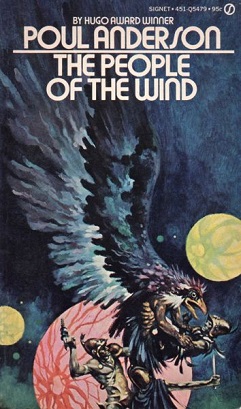
The People of the Wind is a science fiction novel by American writer Poul Anderson, first published in 1973. It was a 1974 nominee of the Nebula Award for Science Fiction. The novel is the last book in Anderson’s Polesotechnic League series. However, since the setting of the book is many generations after the series' two main characters, Nicholas van Rijn and David Falkayn, and many generations before Anderson's follow-up series, the Terran Empire; it is more proper to consider this book a bridge between the two series.
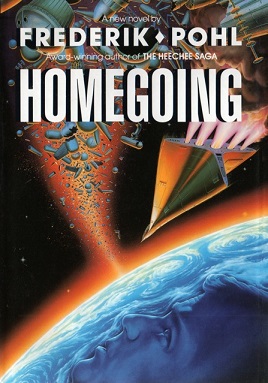
Homegoing is a science fiction novel by American author Frederik Pohl, first published in 1989 by Del Rey Books. The novel was one of the nominees for the Locus SF Award, one of the awards of the Hugo Awards.
Towing Jehovah is a 1994 fantasy novel by American writer James K. Morrow, published by Harcourt Brace. The book is about the death of God and the subsequent towing of his body across the Atlantic Ocean. In 1995 it received the World Fantasy Award for best novel, with two additional best novel awards. It was followed by two sequels in 1996 and 1999.
The Science Fiction Awards Database (SFADB) is an index of science fiction, fantasy, and horror awards compiled by Mark R. Kelly and published by the Locus Science Fiction Foundation. Known formerly as the Locus Index to SF Awards, it has been cited as an invaluable science fiction resource, and is often more up-to-date than the awards' own websites.

An Informal History of the Hugos is a 2018 reference work on science fiction and fantasy written by Jo Walton. In it, she asks if the nominees for the Hugo Award for Best Novel were indeed the best five books of the year, using as reference shortlists from other awards in the genre. After looking at the first 48 years of the award and presenting essays on select nominees, Walton concludes that the Hugo has a 69% success rate. The book was well-received and was itself nominated for a Hugo Award in 2019.















